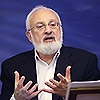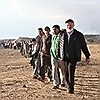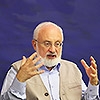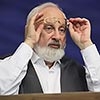Audio Version Of The Blog – 12.13.13
Listen to an Audio Version of the Blog
Download: MP3 Audio
[audio:http://files.kabbalahmedia.info/audio/eng_o_rav_2013-12-13_declamation_blog-rav_full.mp3 title=’13.12.13′]

Listen to an Audio Version of the Blog
Download: MP3 Audio
[audio:http://files.kabbalahmedia.info/audio/eng_o_rav_2013-12-13_declamation_blog-rav_full.mp3 title=’13.12.13′]
Virtual Convention in Moscow, Day 1, Lesson 1
| [media 1] | [media 2] |
Virtual Convention in Moscow, Day 1, Workshop 1
| [media 3] | [media 4] |
 Question: If a person leaves the group, will his accumulated “baggage” be saved or would he have to start all over again when he returns?
Question: If a person leaves the group, will his accumulated “baggage” be saved or would he have to start all over again when he returns?
Answer: He will not have to start anew. He already has a bitter experience that will help him quickly cling to his friends with new strength.
However, it is better to avoid this. There is a fundamental rule: “Whatever happens, just do not leave the group.” We always move forward together with friends because parting with them is separation, turning away from the Creator, which should be avoided. This is against the spiritual process, during which I do not set my states but only strive forward.
Even if the Creator “trips me” on every step, that is His business. I thank Him for evil as for good, and in no way am I ready to deviate from the course.
[122739]
From the 4th part of the Daily Kabbalah Lesson 12/10/13, Writings of Baal HaSulam
Related Material:
Umbilical Cord For Connection To The Upper One
Your Choice: 3-5 Or 35 Years
Longing For The Unknown
 Baal HaSulam, “The Freedom”: …as far as spiritual life is concerned, …here applies a natural law over the collective, to subjugate itself to the individual.
Baal HaSulam, “The Freedom”: …as far as spiritual life is concerned, …here applies a natural law over the collective, to subjugate itself to the individual.
…And since the more developed in the generation is certainly the individual, it follows that when the public wants to relieve themselves of the terrible agony and assume conscious and voluntary development, which is the path of Torah, they have no choice but to subjugate themselves and their physical freedom to the discipline of the individual, and obey the orders and remedies that he will offer them.
Thus you see that in spiritual matters, the authority of the collective is overturned and the law of “taking after the Individual” is applied, that is, the developed individual. For it is plain to see that the developed and the educated in every society are always a small minority. It follows that the success and spiritual well-being of society is bottled and sealed in the hands of the minority.
This law is based on the original HaVaYaH, about which it is said, “I did not change My HaVaYaH,” from the four stages of direct Light, the program of development of desire under the influence of the Light, which is the only thing that acts in reality and defines all its forms. Everything is divided into four stages and their root, Keter, the basis of the source.
Similarly, human society is divided into levels: still, vegetative, animate, and man. The human level in humanity, like the most developed of them, is the smallest in quantity because in these four stages (HaVaYaH) quality continually increases during transition from stage to stage.
In the universe there is an infinite mass of still matter, relative to which the vegetation that covers the Earth seems like a drop in the ocean. But the animate world is smaller relative to the vegetative world, and the human is smaller relative to the animate. Baal HaSulam explains that the entire still level is equivalent to one plant, all plants to one animal, and all animals to one human. Quantity transforms into quality. The development of the entire still level is necessary in order for one plant to come out of it, and the development of all plants is needed for one animal to come out of it. And the whole animate level has to develop so that one human comes out of it.
If we want to advance, then we need to rise to a higher degree, and therefore we have to cleave to someone who is on the next degree. Thus it acts with respect to humanity and with respect to every person who includes the whole world within himself. A person must gather all his qualities of the still, vegetative, and animate levels in a pyramid so that they ultimately cling to the human level and bow before him. The human level in a person is his aspiration to adhere to the Creator. If he organizes himself in this way, then he will not be scattered in different directions, but will save time and turn from the natural path of development to the path of the Light, the acceleration of time.
Everything within a person should be organized in this way, and within a small or large community the same trend should be observed. If a society is organized in this way, it will save a lot of time and will save itself much suffering. If we want to advance on the spiritual path, we have to connect to a developed individual who shows us the way. In faith above reason, which exists on our lower degree, we have to accept his opinion coming from a higher degree and act according to it.
That is, we go forward with his head. Baal HaSulam writes, referring to the words of Rambam (Maimonides) that if a blind crowd has a guide who knows the way, then all the rest will certainly reach the same goal, although they can see neither the path nor the goal. All this comes from the very first HaVaYaH where the relations between quantity and quality have been established.
[122627]
From the Preparation for the Daily Kabbalah lesson 12/9/13
Related Material:
The Future Is Here
The Choice Of The Masses
Locked Between Two Forces
 Question: Why is it that every time our group takes a big step forward to a new qualitative state there are people who don’t succeed and who cannot take that step forward and therefore fall behind?
Question: Why is it that every time our group takes a big step forward to a new qualitative state there are people who don’t succeed and who cannot take that step forward and therefore fall behind?
Answer: It isn’t that they cannot take a step forward, but that they cannot justify the action of the upper Providence on them. A person is taken out of the mass of humanity by forceps and is given personal spiritual treatment. It is just like baby Moses being taken out of the Nile in the basket and brought to the house of Pharaoh. There, he was taken care of, and his ego developed intentionally. He was taught the wisdom of Kabbalah and was told how good he is and that he was selected and more special than anyone else.
He feels good, until different problems arise. He begins to act incorrectly according to his ego, which means that “he kills the Egyptian” in him, and this is where his wanderings begin. It may seem strange that a prince kills his subject, a simple Egyptian, but it is a sign that he is not loyal to Pharaoh anymore and is not adhered to him. So, he must flee and escape to the desert. He goes to Jethro and stays with him for forty years. After being raised and educated in Pharaoh’s home for forty years, he continues to study for another forty years at the home of Jethro, priest of Midian.
This is the evolutionary process we must go through since otherwise you will not be ready to return to Pharaoh and confront him from an equal position, standing straight before him. Without this, you will not be able to bear the ten plagues and feel that it is Pharaoh who receives each one and not you. Moses, who returns from Jethro, is already totally different from Pharaoh. He doesn’t belong to Pharaoh’s home anymore, but rather to the Israeli people, and he already demands, “Let my people go!” Pharaoh turns into an enemy.
Moses learns this approach from Jethro, the great priest of Midian. He must connect to the concept of Jethro, marry his daughter, Tzipora, and have children. This entire process seems very complicated from an external glance. It is hard to understand what all these hardships are for: the struggle between the evil inclination and the Torah that is the means for its correction, and then the exit to spirituality. It isn’t a simple process.
These are processes that every shattered and corrupt soul must go through in order to be corrected and purified. So, people ascend and descend. Someone falls along the way, and another leaps upward. That’s true, but we don’t understand what is happening. The only thing we can do is keep quiet and endure. Only patience can help us here, and I speak from my own experience. I am naturally very impatient, but I am ready to be patient here because it is the only means that can help.
[122621]
From the 2nd part of the Daily Kabbalah Lesson 12/6/13, Writings of Rabash
Related Material:
The “School” Of Jethro
Patience Is The Most Important Quality
The “Aliens” Of Our World
 In the News (from Pew Research Center): “A new report from the World Economic Forum ranks the 10 most important global trends, based on a poll of 1,592 leaders from academia, business, government, and non-profits.
In the News (from Pew Research Center): “A new report from the World Economic Forum ranks the 10 most important global trends, based on a poll of 1,592 leaders from academia, business, government, and non-profits.
“Here are some data points that compare and contrast the public’s views around the world with the trends identified by the experts.
“1. Rising societal tensions in the Middle East and North Africa – People in this region were mostly dissatisfied with their country direction, according to the Pew Research Center’s survey of people across the globe this year. This includes particular disappointment in Lebanon (88% dissatisfied), the Palestinian territories (87%) and Tunisia (81%).
“2. Widening income disparities – One of the most striking findings from our recent survey of general publics across the globe was the degree to which people see the gap between rich and poor as a major challenge. In 31 of 39 nations, half or more of those polled said inequality is a very big problem in their country.
“3. Persistent structural unemployment – The spring survey found that two-thirds or more in most countries say a lack of employment opportunities is a very big problem. When asked which of the four issues – inflation, unemployment, inequality or debt – the government should address first, 22 of the 39 publics surveyed said jobs.
“4. Intensifying cyber threats – U.S. policy experts were very concerned about the threat of cyber-attacks from China, according to our survey last year. However, while the World Economic Forum survey identified cyber threats as a top concern, 47% of experts admitted they have limited knowledge of the problem.
5. Inaction on climate change – A median of 54% or more of people surveyed in Canada, Europe, the Asia Pacific, Latin America and Africa saw global warming as a major threat to their countries, according to our global survey. However, only 40% of Americans and a median of 42% in the Middle East region regarded global climate change as a major concern.
“6. Diminishing confidence in economic policies – In our polls conducted across the globe, people voiced widespread concerns about economic conditions in their countries. Indeed, attitudes were particularly grim in European countries, such as France (only 9% said good), 4% said the same in Spain, 3% in Italy and just 1% in Greece. Nevertheless, in emerging markets such as China, 88% of the people said their economy was doing well.
“7. A lack of values in leadership – Between 2007 and 2012, confidence in Organization for Economic Co-operation and Development (OECD) national governments declined from 45% to 40% on average, making it difficult for national authorities to mobilize support for necessary reforms, according to a recent report by the OECD. In the U.S., public trust in government has fallen substantially since 1958 and is near an all-time low.
“8. The expanding middle class in Asia – More than any other region, Asians are hopeful about the economic prospects for the next generation. In contrast to Asia’s relatively positive outlook, majorities in the United States, Canada, and throughout Western Europe believe the economic future will be worse for the next generation.
“9. The growing importance of megacities – Life is increasingly lived in the world’s urban centers. According to the United Nations Population Division, more than half of the world’s population lives in urban areas. However, not all of the world’s regions are equally urban. Africa, for example, is predicted to reach 50 percent urbanization by 2035.
“10. The rapid spread of misinformation online – One-third (30%) of the world’s youth have been active online for at least five years, according to the International Telecommunication Union. Social networking has also spread around the world. In 19 of 21 countries, about three-in-ten or more of those polled use sites such as Facebook, according to our survey last year.”
My Comment: The report is correct, it just has completely incorrect conclusions. But the organizers can understand; they have not means to solve this crisis. It is not like in the past; it is not at the level of our world but at the level of the forces that control this world. And it can be solved only by raising society to the level of these forces.
This rapid decline of society by all socio-economic indicators tells us about the need to quickly disseminate the method of Integral Education and Upbringing, without which no changes are possible because now they can be only in the direction of destruction or the rise toward unity of a new generation.
[122838]
Related Material:
The Fading Hope For Peace
The Global Crisis Will Not End!
Mikhail Delyagin On The Crisis
 Question: The method of Integral Education teaches those who have a need for change. A child doesn’t need this; things are good for him. And if there is no need, he will not comprehend this method.
Question: The method of Integral Education teaches those who have a need for change. A child doesn’t need this; things are good for him. And if there is no need, he will not comprehend this method.
Answer: Don’t confuse a small child with an adult. We must approach an adult from the angle of his suffering and problems: in the family, at work, with himself, with his finances, with his health. We need to find what is bad for him and specifically turn to him in this way. “You are sick? You will be healthy. You are a failure? You will become successful,” etc. With this it’s possible to interest him and to attract him to classes because eventually the integral group corrects everything. It gradually brings the person to a state of happiness. What does it matter in what form?
We don’t behave like this with a child; we don’t ask him what he wants and what he doesn’t. We need to make an adult out of him! With this goal we must give him a certain amount of knowledge, skills, and most importantly, teach him about correct behavior in society, about correct communications between them.
A child comes to an integral school to absorb everything that they give there in the easiest, best, and most pleasant way, to know how to behave with people and to communicate with them in a good way in order to understand how the entire system works: the management of the city, the management of the nation, the management of the entire world. This is an absolutely different approach. You must transform the child into being integral, meaning, he includes the knowledge of the world within himself and communicates with it in a mutual and successful way.
[122540]
From Kab TV’s “Through Time” 9/24/13
Related Material:
Replacing Outdated Education
The Circle Obliges
Everything Is Arranged According To Equivalence Of Form
 Theory without practical work is considered to be “dead.” However, practical work without theory is simply a small psychological exercise and not the Integral Education of the person through which you link him to the universe, to the upper management, to the Creator, and from where he will be able to receive powers through his society.
Theory without practical work is considered to be “dead.” However, practical work without theory is simply a small psychological exercise and not the Integral Education of the person through which you link him to the universe, to the upper management, to the Creator, and from where he will be able to receive powers through his society.
The person must, if he doesn’t understand it, imagine this, at least roughly, in order to know how and why to go on, and which form he must acquire. A multitude of thoughts appear within him tossing him from side to side, and he must feel this; you must help him stabilize both theoretically and practically.
[122411]
From Kab TV’s “Through Time” 9/24/13
Related Material:
A Little Craftiness Will Not Interfere
Connection With The Light
The Science Of Unity
 Question: Do we need the “street” to continue the development of the integral method?
Question: Do we need the “street” to continue the development of the integral method?
Answer: Sure! The wisdom of Kabbalah and technique of Integral Education as part of it is a practical material realization of the ancient wisdom. Seemingly the entire theory is explained to us, but at the same time, not all of it.
What the Kabbalists of the past left to us from ancient days until our time is described very sparingly. You cannot imagine how many parts are missing! They could not convey all of the nuances of this system that comes from the upper world and descends downward; rather, they gave only a small stream of information that explains in what manner this is connected to us. All the rest of the parts of this immense system are not imperative for us.
We will discover them to the degree of perception of the spiritual world, on every level, in breadth. Therefore, the Kabbalists recorded only what would help us to rise from level to level. Even though these are thick volumes; however, in fact this is only scanty information about the enormous system, about its behavior, about the reactions, about the correction, etc.
Kabbalah is the most practical science. Without practical actions, all of its books are “dead.” And practical action is first and foremost, correction, which is not possible to do without going out to the people. You yourself don’t feel the necessity of your correction, not from above and not from them. By necessity you must be in the middle so that both this and that will press upon you. Everything is realized only in communication, in the use of the method among the people.
But you must more or less recognize the entire system in spite of it all; you must have a strong group that stands behind you. Everything must be gathered together. In going out to the public, you must feel that you are their representative; you must feel that you are found together with them. Without this feeling you cannot give the masses the integral energy that acts to change reality.
[122408]
From Kab TV’s “Through Time” 9/18/13
Related Material:
Both Theoretically And Practically
The Science Of Unity
Connection With The Light
 Baal HaSulam, “The Teaching of Kabbalah and Its Essence”: Whereas in the first discernment everyone receives equally without adding or subtracting, like Adam, in understanding the reality of this world. In viewing it, all are equal, but this is not so in understanding it—some evolve from generation to generation and some regress.
Baal HaSulam, “The Teaching of Kabbalah and Its Essence”: Whereas in the first discernment everyone receives equally without adding or subtracting, like Adam, in understanding the reality of this world. In viewing it, all are equal, but this is not so in understanding it—some evolve from generation to generation and some regress.
Everyone can see the same things in this world, the same phenomena. Yet, it depends on the one who sees them, whether it is a child, an adult, or an old person. The difference is in a person’s mind. After all, their senses have a mind that is behind them that analyze their perceptions; it depends on the level of one’s attainment.
It turns out that we live in very special wonderful conditions. There is no greater wonder than this world: The Creator created it and we can live in it and start our spiritual path from a state that is not spiritual. There is a reality before us that everyone can see, but everyone attains it according to his external understanding.
Suppose I took a photo of a friend working on the construction of our new building: For me it is just someone working, and only later I find out that he volunteers in brotherly mutual guarantee together with all the others, but the photo itself remains the same.
This is the uniqueness of this world: Here everything depends on how a person attains the “frames” that appear before everyone.
[122773]
From the 4th part of the Daily Kabbalah Lesson 12/10/13, Writings of Baal HaSulam, “The Teaching of Kabbalah and Its Essence“
Related Material:
Reality Or A Vision Test Chart?
How Firm Is Our World?
Is Our World Finite?